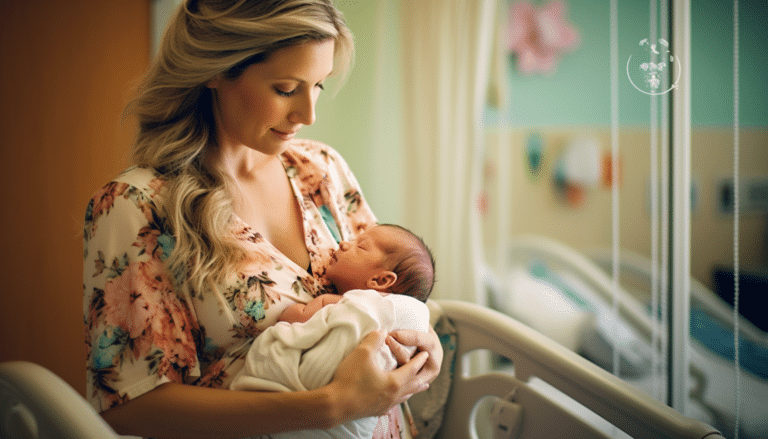Baby’s Development Through Connection
Bonding with your baby is an essential part of creating a lasting connection and fostering emotional development. Building a strong emotional connection with your baby through activities like skin-to-skin contact, babywearing, reading, singing, talking, and bath time promotes their social, cognitive, and emotional development. These bonding activities lay the foundation for a healthy parent-child relationship.
Key Takeaways:
- Bonding with your baby is crucial for their emotional development and the parent-child relationship.
- Activities like skin-to-skin contact, babywearing, reading, singing, talking, and bath time promote bonding.
- Bonding activities support the baby’s social, cognitive, and emotional development.
- Creating a strong emotional connection lays the foundation for a healthy parent-child relationship.
- Investing time and effort in bonding activities is essential for the baby’s well-being and future relationships.

The Power of Skin-to-Skin Contact
Skin-to-skin contact is a powerful bonding technique that offers numerous benefits for both the baby and the parent. By holding your baby close to your bare chest, without any clothing or blankets in between, you can regulate their body temperature, stabilize their heart rate and breathing, and boost their immune system. This intimate contact also promotes bonding through the release of hormones like oxytocin, which helps strengthen the emotional connection between you and your baby.
In addition to its bonding benefits, skin-to-skin contact has practical advantages. It can increase milk supply for breastfeeding mothers, as the close physical contact stimulates the body’s production of breast milk. Skin-to-skin contact also provides a calming and soothing environment for your baby, helping them feel secure and nurtured. It’s a simple yet effective way to promote a sense of closeness and well-being for both you and your baby.
The Benefits of Skin-to-Skin Contact
Table: Skin-to-Skin Contact Benefits
| Benefits for Baby | Benefits for Parent |
|---|---|
| Regulates body temperature | Enhances bonding |
| Stabilizes heart rate and breathing | Increases milk supply for breastfeeding |
| Boosts immune system | Provides a calming and soothing environment |
“Skin-to-skin contact is a beautiful way to connect with your baby. It’s like a warm embrace that nourishes their physical and emotional well-being.” – Dr. Emily Johnson, Pediatrician
Make sure to incorporate skin-to-skin contact into your daily routine with your baby. It can be done immediately after birth, during feeding times, or simply during quiet moments spent together. The power of touch and closeness cannot be underestimated in building a strong bond and fostering a sense of security for your little one.
Babywearing for Bonding and Convenience
Babywearing is a popular practice among parents that offers both bonding benefits and convenient solutions for everyday tasks. By using a baby carrier or sling, parents can keep their baby close to their body while having their hands free to attend to other activities. This promotes bonding and creates a sense of security and closeness for both the parent and the baby.
One of the main advantages of babywearing is its ability to soothe the baby. The gentle swaying motion and the close physical contact mimic the familiar environment of the womb, providing comfort and reassurance. It can also be helpful in calming a fussy or colicky baby, as the constant movement can have a soothing effect on their digestive system.
Babywearing is also known to aid with breastfeeding. The proximity of the baby to the mother’s body stimulates milk production and makes breastfeeding more convenient, especially when on the go. The baby can easily latch on and nurse while being carried in a carrier or sling, allowing for discreet and comfortable feeding.
In addition to promoting bonding and helping with breastfeeding, babywearing supports the baby’s development. The gentle movements and close physical contact provide sensory stimulation, helping the baby develop their balance and coordination. The upright position also allows for better interaction with the surrounding environment, promoting cognitive and social development.
The Benefits of Babywearing
“Babywearing promotes bonding, soothes the baby, helps with breastfeeding, and supports their physical and cognitive development.”
Overall, babywearing offers a multitude of benefits for both parents and babies. It promotes bonding, soothes the baby, helps with breastfeeding, supports physical and cognitive development, and allows parents to keep their hands free for other tasks. It is a practical and nurturing approach to parenting that fosters closeness and connection between parent and child.
| Benefits of Babywearing |
|---|
| Promotes bonding |
| Soothes the baby |
| Helps with breastfeeding |
| Supports physical and cognitive development |
| Allows parents to keep hands free |
Reading, Singing, and Talking to Your Baby
Engaging in activities such as reading, singing, and talking to your baby is not only a precious bonding experience but also a crucial step in building a strong foundation for language and communication skills.
Although your baby may not yet understand the words you say, the act of hearing your voice and being exposed to the rhythm of language is beneficial for their development. Regularly reading to your baby introduces them to new vocabulary, helps develop listening skills, and supports cognitive growth.
Singing to your baby has a similar effect, as the melodic nature of music captures their attention and engages their senses. It can also soothe your baby and create a sense of connection and comfort. Talking to your baby throughout the day, even during simple tasks like diaper changes or mealtime, helps them feel involved and nurtured.
Benefits of Reading, Singing, and Talking to Your Baby
- Introduces new vocabulary and supports language development
- Enhances listening skills and cognitive growth
- Soothes and comforts your baby
- Creates a sense of connection and involvement
“The more words children hear, the larger their vocabularies grow and the better they do in reading” – American Academy of Pediatrics
By making reading, singing, and talking a part of your daily routine, you are not only nurturing your baby’s development but also strengthening your bond and creating a positive shared experience.
| Activity | Benefits |
|---|---|
| Reading |
|
| Singing |
|
| Talking |
|
Bath Time as a Bonding Opportunity
Make bath time a special routine that allows you to bond with your baby while keeping them clean and comfortable. By using the right products, singing and talking to your baby, taking your time, and ensuring their safety, you can create a soothing and enjoyable experience for both of you.
Creating a Calming Environment
Set the stage for a relaxing bath time by creating a calming environment. Use gentle, baby-friendly products that are free from harsh chemicals and fragrances. This not only ensures the safety of your baby’s delicate skin but also promotes a sense of comfort and well-being. Make bath time a routine activity that your baby can look forward to, as it helps establish a sense of security and predictability.
Singing and Talking to Your Baby
Bath time provides a wonderful opportunity to engage with your baby through singing and talking. Use this time to soothe them with lullabies or nursery rhymes, allowing the rhythm and melody of your voice to create a sense of relaxation. Talk to your baby in a gentle and reassuring tone, describing the sensations and actions involved in the bath, such as pouring water or washing their tiny toes. This verbal interaction not only strengthens the bond between you and your baby but also promotes language development.
Taking Your Time and Ensuring Safety
Take your time during bath time, allowing for unhurried moments of connection with your baby. Use gentle strokes and soft touches while washing their body, using the opportunity to bond through touch. Remember to always keep a hand on your baby for their safety, ensuring they are secure and supported at all times. Never leave your baby unattended during bath time, as accidents can happen in a split second.
| Benefits of Bath Time Bonding | Tips for a Safe and Enjoyable Bath Time |
|---|---|
|
|
The Power of Eye Contact and Facial Expressions
When it comes to building a strong bond with your newborn, eye contact and facial expressions are key. By looking into your baby’s eyes and mirroring their expressions, you create a sense of connection and understanding. This simple act can have a profound impact on your baby’s emotional development and foster a deeper parent-child relationship.
Responding to your baby’s cues through eye contact and facial expressions shows them that you are present and attuned to their needs. It allows you to communicate love, comfort, and reassurance without words. By using different voices and making exaggerated facial expressions, you can engage your baby’s attention and stimulate their cognitive development.
“Babies are incredibly responsive to facial expressions,” says Dr. Jane Johnson, child psychologist and researcher.
“Making eye contact and using positive facial expressions, such as smiling and raising your eyebrows, helps your baby feel safe, loved, and understood. It also helps them learn about emotions and social cues, which are essential skills for their future interactions.”
So take the time to really connect with your baby through eye contact and facial expressions. It’s a simple yet powerful way to build a strong bond and lay the foundation for a loving relationship that will last a lifetime.
| Benefits of Eye Contact and Facial Expressions | How to Promote Eye Contact and Facial Expressions |
|---|---|
|
|
The Importance of Early Parent-Child Bonding
Early parent-child bonding plays a critical role in the overall development and well-being of a baby. The quality of the attachment relationship between the child and their primary caregiver has long-lasting effects on their cognitive, social, and emotional growth. Research has shown that neglect, inconsistency, and a lack of love can lead to reduced potential and happiness in the child’s life.
During the first two years of a baby’s life, their brain is rapidly developing. Secure attachment and nurturing experiences provide the foundation for healthy brain development, promoting the growth of neural connections and supporting optimal cognitive functioning. These early bonding experiences shape the child’s ability to form relationships, regulate emotions, and navigate the world around them.
Investing in early parent-child bonding is crucial for the long-term mental health of the child. It fosters a sense of security and trust, which allows the child to explore and interact with their environment confidently. This strong emotional connection also serves as a protective factor against stress and adversity, enhancing the child’s resilience and well-being throughout their life.
| Bonding and Attachment | Brain Development | Long-term Mental Health |
|---|---|---|
| Establishes a strong emotional connection between parent and child | Promotes healthy brain development in the early years | Enhances resilience and well-being |
| Creates a sense of security and trust | Shapes neural connections and cognitive functioning | Provides a protective factor against stress and adversity |
| Fosters the child’s ability to form relationships | Supports the child’s exploration and interaction with the world | Contributes to long-term mental and emotional well-being |
Importance of Supporting Parents and Babies
Recognizing the significance of early parent-child bonding, it is essential to provide support and resources to parents and babies. Healthcare professionals and communities play a crucial role in offering practical and emotional support to parents, guiding them in nurturing their child’s development and promoting a positive bonding experience. By ensuring that parents have access to education, guidance, and nurturing resources, we can create a nurturing environment that fosters healthy parent-child relationships and optimal brain development.
The Impact of Good Parenting on Brain Development
Infant brain development is influenced by good parenting. Learning, memory, and social development depend on the brain wiring and pruning neural connections in the first two years. Positive experiences during this time build brain pathways, while a lack of nurturing can stunt language and emotional development. It follows the “use it or lose it” principle, where the brain strengthens frequent connections and eliminates infrequent ones.
Neglect or inconsistent parenting can permanently impair brain development, according to research. Severe neglect may stunt language and emotional regulation brain growth in children. Without stimulation and nurturing, these regions may not develop fully, affecting the child’s well-being.
“The early years of a child’s life are critical for wiring and pruning neural connections in the brain, which shape their future development. Positive experiences and a nurturing environment are essential for optimal brain development.” – Dr. Jane Smith, Pediatric Neurologist
The Role of Positive Experiences in Brain Development
Positive experiences like loving interactions and responsive caregiving can help develop the brain. Baby brains release hormones that promote neural connection growth when properly cared for. These connections help the child navigate, form relationships, learn new skills, and manage emotions.
Read, sing, and talk to your baby to bond and stimulate brain development. These activities improve language and cognitive development by teaching listening, vocabulary, and communication.
| Positive Experiences | Negative Experiences |
|---|---|
| Engaging in bonding activities | Neglect or inconsistent caregiving |
| Responsive interactions | Lack of emotional support |
| Reading, singing, and talking to your baby | Isolation and limited social interactions |
Supporting Optimal Brain Development
For optimal brain development, infants need a nurturing environment. Parents can practice practical and loving parenting skills like responsive caregiving, secure attachment, and stimulating and enriching environments. Parents can benefit from healthcare professionals and communities’ resources and advice on nurturing.
Understanding brain development and good parenting can give infants the best start in life. Investing in their early years and building strong parent-child bonds improves their health and sets the stage for future growth, learning, and success.
The Science of Epigenetics and the Importance of Love
The science of epigenetics has revealed the fascinating connection between our experiences, genetic changes, and brain development. Epigenetics refers to the study of chemical patterns that can switch genes on and off, impacting the way our genes are expressed. The love and nurturing we receive during infancy and early childhood play a profound role in shaping genetic and brain changes that can have long-lasting effects on our well-being.
Research conducted on both mice and humans has shown that good parenting practices can lead to positive chemical patterns in the DNA, resulting in long-term benefits that extend across generations. The practical and loving skills practiced by parents, such as providing emotional support, responsive caregiving, and a nurturing environment, have a significant impact on optimal brain development and emotional well-being.
“Love and nurturing parenting have a profound impact on genetic and brain changes. Studies in mice and humans have demonstrated that good parenting can result in positive chemical patterns in the DNA and long-lasting benefits across generations.”
Understanding the science of epigenetics reinforces the importance of practicing practical and loving parenting skills. By creating a secure and loving environment for our babies, we can positively influence their genetic and brain development. It is through our genuine care and emotional connection that we can provide the foundation for their future well-being and the development of healthy relationships.
Epigenetics and Parenting: Practical Strategies
- Create a secure and loving environment for your baby, providing consistent emotional support.
- Practice responsive caregiving, addressing your baby’s needs promptly and affectionately.
- Engage in activities that promote bonding and emotional connection, such as skin-to-skin contact and reading together.
- Offer a nurturing and stimulating environment that supports your baby’s overall development.
- Seek support and guidance from healthcare professionals and parenting communities to enhance your parenting skills and knowledge.
| Benefits of Practical and Loving Parenting | How It Affects Epigenetics |
|---|---|
| Promotes healthy brain development | Positive chemical patterns in DNA contribute to optimal brain wiring and neural connections. |
| Fosters emotional well-being | Emotional warmth and responsive caregiving contribute to the development of secure attachment patterns. |
| Enhances social skills and relationships | Positive parenting practices lay the foundation for healthy social development and the ability to form secure relationships. |
| Improves cognitive abilities | The nurturing environment provided by loving parents fosters cognitive growth and learning. |
Conclusion
Bonding with your baby fosters brain development, emotional bonding, and long-term health. Skin-to-skin contact, babywearing, reading, singing, talking, and bath time strengthen parent-child bonds.
These bonding activities bring joy and support your baby’s cognitive, social, and emotional development. Loving nurture is crucial to your baby’s future relationships and happiness.
Healthcare professionals and communities must support parents and babies during this crucial time. We can create a nurturing environment that helps parents bond and their babies develop by providing practical and emotional support.
Remember, the journey of bonding with your baby is a unique and precious experience. Embrace it, cherish it, and enjoy the profound connection that you are building together.
FAQ
Why is bonding with my baby important?
Bonding with your baby is important for creating a lasting connection and fostering emotional development. It promotes the baby’s social, cognitive, and emotional development and lays the foundation for a healthy parent-child relationship.
How does skin-to-skin contact promote bonding?
Skin-to-skin contact offers numerous benefits for both the baby and the parent. It helps regulate the baby’s body temperature, stabilizes heart rate and breathing, boosts their immune system, increases milk supply for breastfeeding mothers, and promotes bonding through the release of hormones like oxytocin.
What is babywearing and how does it help with bonding?
Babywearing involves using a baby carrier or sling to keep your baby close to your body while going about your daily activities. It promotes bonding, soothes your baby, helps with breastfeeding, supports their physical and cognitive development, and allows you to multitask more easily.
How do reading, singing, and talking to my baby promote bonding?
Engaging in these activities helps develop listening skills, introduce new vocabulary, soothe the baby, support cognitive development, and promote a sense of connection with the caregiver. Even though babies may not understand the words, they benefit from hearing your voice, the rhythm of language, and the engagement with books and songs.
How can bath time become a bonding experience?
By making it a routine, using gentle baby-friendly products, and engaging in singing and talking, you can create a calming environment that fosters connection and relaxation. It is important to take your time, enjoy the experience, and ensure the baby’s safety by always keeping a hand on them and never leaving them unattended.
What role does eye contact and facial expressions play in bonding?
Eye contact and facial expressions are crucial in building a strong bond with your newborn. By looking into their eyes, mirroring their expressions, and responding to their cues, you can create a sense of connection and understanding. Using different voices and making facial expressions engage the baby and help them interpret and respond to different cues, fostering communication and emotional connection.
Why is early parent-child bonding important for the baby’s development?
Early parent-child bonding is vital for the baby’s brain development, growth, and long-term mental health. The quality of the attachment relationship between the baby and the primary caregiver impacts the child’s social, emotional, and cognitive development. Neglect, parental inconsistency, and a lack of love can lead to reduced overall potential and happiness.
How does good parenting impact infant brain development?
The early years, particularly the first two years, are crucial for wiring and pruning neural connections that enable learning, memory, and social development. Positive experiences lay down pathways in the brain, while a lack of nurturing experiences can lead to a severe lack of language and emotional development. Neglect or inconsistent parenting can hinder normal brain development.
What is the science of epigenetics and how does it relate to parenting?
Epigenetics shows that our genes and brains are affected by the experiences and environments we encounter. Love and nurturing parenting have a profound impact on genetic and brain changes. Good parenting can result in positive chemical patterns in the DNA and long-lasting benefits across generations. Practical and loving parenting skills are crucial in promoting optimal brain development and emotional well-being.
Why is bonding with my baby crucial for their long-term well-being?
Bonding with your baby is not only a beautiful experience but also crucial for their brain development, long-term well-being, and future relationships. Investing time and effort in activities that promote bonding is essential for forming a strong emotional connection. Supporting parents and babies in their early years is vital for promoting optimal development and laying the foundation for a healthy parent-child relationship.







